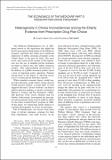Heterogeneity in Choice Inconsistencies among the Elderly: Evidence from Prescription Drug Plan Choice
Author(s)
Abaluck, Jason Todd; Gruber, Jonathan
DownloadGruber_Heterogeneity in.pdf (528.8Kb)
PUBLISHER_POLICY
Publisher Policy
Article is made available in accordance with the publisher's policy and may be subject to US copyright law. Please refer to the publisher's site for terms of use.
Terms of use
Metadata
Show full item recordAbstract
This paper investigates the degree to which choice inconsistencies documented in the context of Medicare Part D plan choice vary across consumers and geographic regions. Our main finding is that there is surprisingly little variation: regardless of age, gender, predicted drug expenditures or the predictability of drug demand consumers underweight out of pocket costs relative to premiums and fail to consider the individualized consequences of plan characteristics; as a result, they frequently choose plans which are dominated in the sense that an alternative plan provides better risk protection at a lower cost. We find limited evidence that the sickest individuals had more difficulty with plan choice, and we document that much of the variation in potential cost savings across states comes from variation in choice sets, not variation in consumers ability to choose.
Date issued
2011-05Department
Massachusetts Institute of Technology. Department of EconomicsJournal
American Economic Review
Publisher
American Economic Association
Citation
Abaluck, Jason, and Jonathan Gruber. “Heterogeneity in Choice Inconsistencies Among the Elderly: Evidence from Prescription Drug Plan Choice.” American Economic Review 101.3 (2011): 377–381. © 2011 AEA
Version: Final published version
ISSN
0002-8282
1944-7981